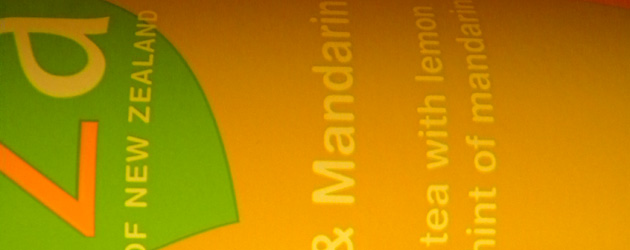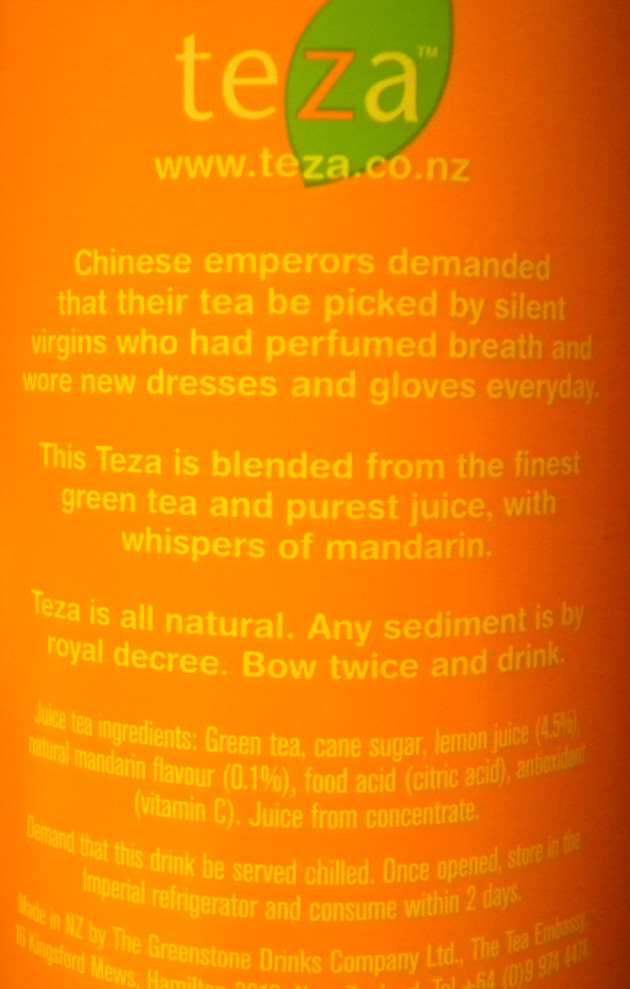
It does not matter what I think of a product. This is not a product review. It is a management review. I have to ask, who at The Greenstone Drinks Company, made the decision to go into business? Does the world need another drink? If it does, wouldn’t you think that it had better be a great new drink? I was in Auckland and saw this new product. Being a sucker for great flavours, and an admirer of New Zealand products, I reached for this bottle that said, ‘Lemon & Mandarin’. I have to say that Mandarin is a special fruity flavour that activates my senses. So I went to the cashier and found out that the small bottle of 325 ml was $5.00. My first reaction was, ‘Wow, an expensive drink. This must be a top-grade product. How delightful! It must be good if it is that expensive.’ So I paid with joy.
The label even had a gold sticker that said, ‘Winner Food Awards’ and if you had the eyes of a Hubble telescope, you could read the ‘Massy University’ hidden in that phrase. I am never impressed with awards. What do I care what a panel of judges thinks. So I started my journey and was unimpressed. Oh dear. How sad. Why launch a new products and miss an opportunity to impress? Anyway, who cares what I think. Perhaps many in the focus group just loved it. I really don’t care. I just will not buy that product again. But here is the lesson for product managers: people bang their head against brick walls, trying to launch a new product via the ruthless distribution channel. So if Teza had the gods smiling upon it, and if it was blessed enough to get onto the shelves in a crowded market, and be able to over-price itself, then it had better not forget the primary law of product development: make sure it is delicious.
I would wish Teza all the best, but does the company deserve it? New TV ads, fancy cars, nice packaging, and all that environmentaly-friendly nonsense that it espouses… all for what? Here is the problem: my taste-buds are well honed. My nose is larger than your average, and it can smell things at a thousand paces. I do not drink alcohol. I do not smoke. I have strong state-buds. And despite all this, I closed my eyes, and could not SMELL the mandarin. I could not TASTE the mandarin! Yet the colour of the label, the colour of the liquid, and the word ‘Mandarin’ had lured me.
I started to take an interest in the fine print, and this is what the back label says, ‘Chinese emperors demanded that their tea be picked by silent virgins who had perfumed breath and wore new dresses and gloves every day.’ What’s that got to do with anything? The feminists would be outraged. Was this slave labour? Anyway, what’s that got to do with Teza and this drink? The next paragraph states, ‘This Teza is blended from the finest green tea and purest juice, with whispers of mandarin.’ It all sounds perfect. But really, what do companies mean when they boast about sourcing the finest? How can every company use the finest ingredients? Surely the ‘finest’ implies that there was a selection; a large batch, from which the company selected only the finest. So what happened to the other 90% of the basic-grade tea? Who uses that tea? And what do they proclaim on their labels? I bet you that they will say that they selected the finest as well!
Anyway, the bit that got me was the ‘purest juice’. I have been a member of the juice-police for decades. I always insist on real fresh juice. And this label promised it. It was saying that the bottle contained the purest juice, so I presumed that it contained Mandarin. So I went in search of the list of ingredients, and it said, ‘Green tea, cane sugar, lemon juice (4.5%), natural mandarin flavour (0.1%), food acid (citric acid), antioxidant (vitamin C). Juice from concentrate.’ I love the antioxidant bandwagon, but I shall skip over this.
What on earth are we talking about here? Where is the mandarin? It said mandarin flavour. No mandarin, just the flavouring of one. Is that allowed? Why would a bottle emblazon this on the front when the advertised contents do not exist? And not heaps of flavour, not enough to smell it or taste it, and only 0.1%. Can you imagine how much that is? What is 0.1 percent of 325 mls? It is not even one millilitre. Not even half a millilitre. It is 0.325 of a millilitre. Can anyone from any focus group ever measure out how much this is? Indeed the label states that it is a ‘hint’. But I could not detect any. And if so, one presumes that the hint would come from real juice. Alas not.
And it is not even mandarin. It is a flavouring, despite us being told Teza uses the purest juice. So an average consumer would expect to receive some juice from a mandarin.
So this is the management lesson: don’t lie. State the obvious. Don’t mislead people. This $5 bottle lured me with the colours and the label whose largest type (apart from the logo) said, Lemon & Mandarin. And even then, I could not taste the lemon, and now I doubt that it contained lemon at all. Citric acid might be lemon, but it is not from a lemon, is it! And even if it were, the label says juice from concentrate. How do you concentrate a lemon? It is all very messy. Why mislead people to such a degree?
If the owners of this company loved the product, then they should go out and sell the product. Don’t carry-on about the ‘purist this’ and the ‘finest that’ when it contains neither. Grow up and get real. Managers would do well to stop distracting themselves with the greening of the planet. All that goodness is just too distracting. Make a bloody great flavour, and people will buy your product. If there is no mandarin, don’t say that there is. Simple. Why must managers complicate everything? Our New Zealand friends at the Greenstone Drinks Company have a website that speaks about Chinese philosophy. Before we go back that far, how about some Aussie Philosophy that starts and ends with three words: Fair Dinkum Mate!




Comments are closed.